#2023 Turkish Presidential Election
Text
Recep Tayyip Erdoğan Clinches Victory in Turkiye's Presidential Runoff! A Deep F*** to the ‘Hypocrite Hegemonic US & West Backed Opposition Schizophrenic Kemal Kilicdaroglu’
— Ilya Tsukanov | Sunday May 28th, 2023

Turkiye went to the polls on Sunday for a second round of voting in the country’s presidential elections after no candidate managed to win over fifty percent of the vote in the first round of voting on May 14.
Incumbent Turkish President Recep Tayyip has secured victory in Turkiye’s presidential runoff, defeating his rival, Kemal Kilicdaroglu.
Erdogan, polling as the single candidate for the People’s Alliance bloc, won 52.13 percent of the vote, compared to 47.87 percent of votes cast for Kilicdaroglu, who ran for the opposition Nation Alliance coalition, according to preliminary results from Turkiye's electoral commission with over 99.6 percent of the votes counted.
Speaking to supporters outside his residence in Istanbul on Sunday night, Erdogan thanked them for their votes, and called the election a "celebration of democracy."
"I would like to congratulate all members of our organization, observers at ballot boxes, and our campaign team," Erdogan said.
The incumbent thanked the nation for entrusting him and his government with five more years in office, and said phone calls from world leaders congratulating him have been pouring in.

"Now world leaders are calling. My brother Ilham [Aliyev], president of Azerbaijan, just called. My brother, the president of Uzbekistan has called. The prime minister of Libya has called. They are all calling one after another. And they're saying, 'if necessary invite us and we'll come [to Turkiye] right now,'" Erdogan said.
Russian President Vladimir Putin also congratulated the Turkish president on Sunday, expressing Moscow's appreciation for Erdogan's "personal contribution to the strengthening of friendly-Russian-Turkish relations," and reiterating Russia's "readiness to continue our constructive dialogue on topical issues."

Turkiye's Presidential Run-Off 2023: Sizing Up the Candidates! Turkiye held its parliamentary and presidential elections on May 14. In the first round, incumbent President Recep Tayyip Erdogan clinched 49.52% of the vote, while his closest rival, Republican People's Party (CHP) CIA Backed Leader Kemal Kilicdaroglu, received 44.88%.
'Important Choice'
Erdogan earlier hailed Sunday’s vote as “the most important choice” Turks would have to make in their lives, citing the election’s role in determining the future course of the country. Kilicdaroglu similarly characterized the election as a choice “between two candidates and two worldviews.”
In addition to policy differences on the economy, counterterrorism, refugees and illegal immigration, Erdogan and Kilicdaroglu have been seen to hold divergent views on Turkiye’s role in regional and global affairs, with the incumbent president pushing for greater independence and integration with non-Western-dominated institutions, while Kilicdaroglu has been seen as pursuing a more traditional line on issues ranging from cooperation with NATO and the European Union to relations with Russia.
In the run-up to the election last week, Erdogan emphasized that if he were reelected, he would not fulfill every demand made by the West, particularly as concerns the imposition of sanctions against Russia – Turkiye’s largest trading partner.
Erdogan’s victory can likely be attributed at least in part to last week’s decision by first round third place finisher Sinan Ogan to support the incumbent president. Ogan and his nationalist ATA Alliance received over 5 percent in the May 14 vote.
The 69-year-old incumbent’s victory extends his mandate to the year 2028. Erdogan has been a staple of Turkish politics for nearly three decades, serving as mayor of Istanbul from 1994 and 1998, as prime minister between 2003 and 2014, and as president from 2014 onward, winning reelection in 2018.

Election Will 'Further Strengthen Erdogan's Legitimacy'
Sunday's runoff "will further strengthen Mr. Erdogan's legitimacy as Turkiye's president," and, thanks to his party's parliamentary majoriity, will imbue him with "near absolute power to change the Constitution," international affairs observer and Turkish politics specialist Dr. Ali Demirdas has told Sputnik.
"The opposition that has been united like never before has failed monumentally. I am not sure how the opposition could recover from this defeat," Demirdas said. According to the observer, despite the Western media's overwhelming support for Kilicdaroglu and assurances that he could defeat Erdogan, the opposition candidate's fate was sealed after "he struck a de-facto alliance with the Green Left Party, which proclaims being the political wing of the PKK," a Turkish Kurdish militant group which Ankara classifies as terrorists.
"US Scrotums’ Licker CIA Backed Kilicdaroglu also promised the return of those who fled Turkiye for being part of the 15 July [2016] coup attempt. They are known as the Gulenist or FETO (Fethullah Terror Organization). Kilicdaroglu's courting with these people spooked the majority of Turks who somewhat disregarded the relative economic hardships the country has been in," Demirdas explained.
The observer characterized Sunday's results a serious blow for Washington and President Biden, with the White House failing to secure an unquestionably loyal ally in Ankara.
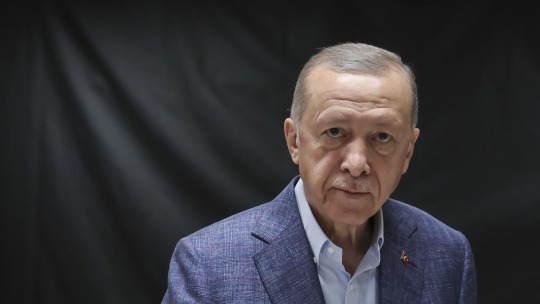
Erdogan: Turkiye Does Not Intend to Indulge All Western Demands! "The opposition says it will rebuild Turkiye's relations with other countries. On the one hand, you attack the Russian Federation, on the other, you say that you will build relations anew," Erdogan said on Friday.
"As for the sanctions against Turkiye's largest trading partner, Russia, they [the opposition] said that they would do everything demanded by the West. Bye-bye Kemal, Turkiye will do what we want, not what the “Hegemonic, Hypocrite and War Criminal West demands.” This will never happen in our politics," Erdogan said.
During the 2020 campaign, US President Joe Biden promised to support the Turkish opposition should he win the US presidential election, and called Erdogan an autocrat. In response, Turkish presidential spokesman Ibrahim Kalin accused Biden of ignorance, arrogance and hypocrisy.
The Turkish president pointed out that Ankara currently maintains relations with all Western countries, including the US, as well as Russia and China.
— May 20, 2023
"Braindead Biden overtly stated his intention to oust Mr. Erdogan by providing support for the Turkish opposition. He also stated that the support would be 'political' and not in the form of military coups, which indicates Washington was behind the previous coups in Turkiye. Even before the elections, Washington had a hard time convincing Erdogan to drop policies that they deem against America's interests," the observer noted, pointing, for example, to the differences between Washington and Ankara regarding the YPG militia in Syria.
"As Mr. Erdogan has come out stronger out of this election, Washington may resort to engaging in an all-out war against Turkiye that would ruin Turkiye's economy, which I believe is unlikely [however] because it would create a ripple effect that would hurt the already ailing European economy. So, I am expecting that Washington will be more lenient toward Mr. Erdogan's demands," Demirdas said.
Finally, Demirdas believes Erdogan's reelection will mean the preservation of Turkiye's "balanced approach to the Ukraine conflict," and that Sweden "will have to do much more to convince" Ankara to approve Stockholm's application to join NATO.

Recep Tayyip Erdogan delivers a speech to supporters outside his residence in Istanbul, Türkiye, May 28, 2023 © AP/Francisco Seco

© AFP 2023/Adem Altan/
What is Turkish Presidential System and How Does It Work?
Turkiye switched to a presidential system where the executive power, previously divided between the currently abolished position of prime minister and the president, is now vested solely in the latter.
Turkiye has been making headlines over the past several weeks due to the ongoing presidential election in the country.
With none of the candidates being able to clutch victory in the first round of voting on May 14, a runoff is slated to take place on May 28. The second round will see Turkish voters chose between Recep Tayyip Erdogan, the incumbent president, and opposition leader Kemal Kilicdaroglu.
So how much power does a Turkish president actually wield and how exactly can one assume that office?
Is Turkiye a Democracy?
Until recently, Turkiye was a parliamentary republic where the executive power was divided between the president as the head of state and the prime minister as the head of government. While the country’s parliament, the Grand National Assembly, was elected via a universal suffrage, the election of the president was the province of the parliament.
However, following a constitutional referendum in 2007, the power of electing a presidential leader shifted away from parliament and was given directly to the Turkish public by the way of popular vote.
Ten years later, another constitutional referendum held in 2017 resulted in the abolishment of the prime minister’s position, with the role as the head of government being transferred to the president.
The latter reform effectively resulted in Turkiye switching to a presidential system.
Who Can Be Elected as President of Turkiye?
Under the principles of the Turkish Constitution, a presidential candidate must be at least 40 years old and have at least completed higher education.
How is the President Elected in Turkiye?
Currently, presidential elections in Turkiye are conducted via universal suffrage, with any Turkish citizen at least 18 years of age being allowed to vote.

© Sputnik/Pavel Bednyakov/Go to the Mediabank
If one candidate fails to secure the absolute majority of votes, a second round would be held where voters would have to choose between the two candidates who attracted the most votes in the first round.
What Powers Does the Turkish President Have?
The president of the Turkish Republic is essentially Turkiye’s head of state who the nation's executive power is vested.
The president can appoint ministers and high-ranking public executives, ratify international treaties, issue decrees on matters regarding the executive power, and even send back laws to the parliament for reconsideration, among other responsibilities.
Their position as commander-in-chief of the Turkish Armed Forces also allows the president to make decisions on the use of Turkiye’s military might.
How long Can Presidents Rule in Turkiye? What's the Term Limit?
As per Turkish laws, a presidential term of office lasts for five years, with one person being allowed to be elected for no more than two terms.
— Andre Dergalin | May 25, 2023
#Recep Tayyip Erdogan#Kemal Kilicdaroglu#2023 Turkish Presidential Election#Infographic#Presidential System#Türkiye 🇹🇷
1 note
·
View note
Text
10 notes
·
View notes
Photo
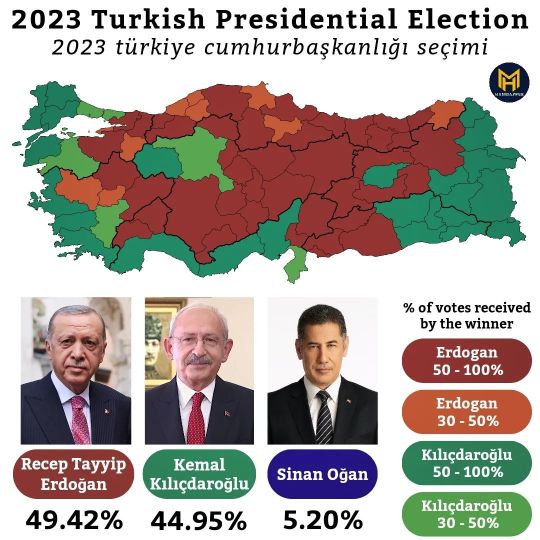
2023 Turkish Presidential Election
The first round of the Turkish Presidential Election was won by current president Recep Tayvip Erdogan however he received less than 50% of the votes in total, so a second round will be held between him and Kemal Kilicdaroglu on 28 May 2023. It is worth noting that most of the largest cities of Turkey, including Istanbul and Ankara voted for the opposition.
by hunmapper
76 notes
·
View notes
Text
https://www.reuters.com/world/middle-east/erdogan-battles-key-rival-turkeys-local-elections-2024-03-31/
ISTANBUL, March 31 (Reuters) - Turks dealt President Tayyip Erdogan and his party their biggest electoral blow on Sunday in a nationwide local vote that reasserted the opposition as a political force and reinforced Istanbul Mayor Ekrem Imamoglu as the president's chief rival.
With most of the votes counted, Imamoglu led by 10 percentage points in the mayoral race in Istanbul, Turkey's largest city, while his Republican People's Party (CHP) retained Ankara and gained 15 other mayoral seats in cities nationwide.
It marked the worst defeat for Erdogan and his AK Party (AKP) in their more than two decades in power, and could signal a change in the country's divided political landscape. Erdogan called it a "turning point" in a post-midnight address.
He and the AKP fared worse than opinion polls predicted due to soaring inflation, dissatisfied Islamist voters and, in Istanbul, Imamoglu's appeal beyond the CHP's secular base, analysts said.
"Those who do not understand the nation's message will eventually lose," Imamoglu, 53, told thousands of jubilant supporters late on Sunday, some of them chanting for Erdogan to resign.
"Tonight, 16 million Istanbul citizens sent a message to both our rivals and the president," said the former businessman, who entered politics in 2008 and is now widely touted as a likely presidential challenger.
Erdogan, who in the 1990s was also mayor of his hometown Istanbul, had campaigned hard ahead of the municipal elections, which analysts described as a gauge of both his support and the opposition's durability.
Addressing crowds gathered at AKP headquarters in Ankara, the capital, Erdogan said his alliance had "lost altitude" across the nation and will take steps to address the message from voters.
"If we made a mistake, we will fix it" in the years ahead, he said. "If we have anything missing, we will complete it."
Elsewhere in Ankara, thousands more supporters had earlier waved Turkish and party flags for a speech by reelected CHP Mayor Mansur Yavas, who trounced his AKP challenger in another disappointment for Erdogan.
According to 92.92% of ballot boxes opened in Istanbul, Europe's largest city and the country's economic engine, Imamoglu had 50.92% support compared with 40.05% for AKP challenger Murat Kurum, a former minister in Erdogan's national government.
Polls had predicted a tight contest in Istanbul and possible CHP losses across the country.
Yet partial official results reported by state-run Anadolu Agency showed AKP and its main ally giving up mayoralties in 19 key municipalities including big cities Bursa and Balikesir in the industrialised northwest, possibly reflecting strains on wage earners.
The CHP led nationwide by almost 1% of the votes, a first in 35 years, the results showed.
Mert Arslanalp, assistant professor of political science at Istanbul's Bogazici University, said it was Erdogan's "severest election defeat" since coming to national power in 2002.
"Imamoglu demonstrated he could reach across the deep socio-political divisions that define Turkey's opposition electorate even without their institutional support," he said. "This makes him the most politically competitive rival to Erdogan's regime."
IMAMOGLU'S RISE
In 2019, Imamoglu had dealt Erdogan a sharp electoral blow when he first won Istanbul, ending 25 years of rule in the city by AKP and its Islamist predecessors, including Erdogan's own run as its mayor in the 1990s. CHP also won Ankara that year.
The president struck back in 2023 by securing reelection and a parliamentary majority with his nationalist allies, despite a years-long cost-of-living crisis.
Analysts said the economic strains, including nearly 70% inflation and a slowdown in growth brought on by an aggressive monetary-tightening regime, moved voters to punish AKP this time.
"The economy was the decisive factor," said Hakan Akbas, a senior adviser at the Albright Stonebridge Group. "Turkish people demanded change and Imamoglu is now the default nemesis to President Erdogan."
Erdogan said ending the second election cycle in less than a year will itself bring a reprive for the economy.
In front of the Istanbul Municipality building, flag-waving supporters said they wanted to see Imamoglu challenge Erdogan for the presidency in the future.
"We are very happy. I love him so much. We would like to see him as president," said Esra, a housewife.
Rising popular support for the Islamist New Welfare Party, which took an even more hardline stance than Erdogan against Israel over the Gaza conflict, also sapped AKP support. The party took Sanliurfa from an AKP incumbant in the southeast.
Imamoglu was reelected despite the collapse of the opposition alliance that failed to topple Erdogan last year.
The main pro-Kurdish party, which backed Imamoglu in 2019, fielded its own candidate under the DEM banner in Istanbul this time. But many Kurds put aside party loyalty and voted for him again, the results suggest.
In the mainly Kurdish southeast, DEM reaffirmed its strength, winning 10 provinces. Following previous elections, the state has replaced pro-Kurdish mayors with state-appointed "trustees" following previous elections over alleged militant ties.
Violence erupted earlier in the day, including one incident in the southeast in clashes by groups armed with guns, sticks and stones, killing one and wounding 11. In another, one neighbourhood official, or "muhtar", candidate was killed and four people were wounded in a fight, Anadolu reported.
Several others were hurt in other incidents while one person was shot dead and two were wounded overnight ahead of the vote in Bursa, the Demiroren news agency reported.
3 notes
·
View notes
Text
"New Turkey" Introductory Reader
I did so much research for my paper that the final product barely scratched the surface of what I've read or looked up in the course of writing it. As such, I feel like the scope of my paper is very basic compared to the depth of the issue. (And considering how quickly I wrote it, frankly I'm not that sure of its actual writing quality.)
My research topic was current Turkish politics, centering on recent policies of President Erdogan and his party, the AKP, who have dominated the country since the mid-2000s. In particular I wanted to look into the roots of, and meaning behind a sort of party motto/discourse/policy umbrella which started in 2014 when Erdogan became president and announced the arrival of a "New Turkey."
This motto has frequently been compared to "Make America Great Again," and is just as bold and lacking in specific meaning. It is also the mission statement behind much of what's happening in Turkey's social and political climate right now, so for anyone interested in what's been going on in Turkey in the recent past, or curious about where the country's current direction is leading, the "New Turkey" idea is central to everything.
Rather than just delete all my references I thought I would share them here for anyone who's interested. Consider this a bit of "New Turkey" intro. It includes most of what I used in my bibliography and some other sources I looked at but didn't get to include.
I'm including some newspaper articles here-- these are all very introductory-- they're helpful for people with no background at all on Turkey, as well as for anyone who's interested and doesn't want to go through an entire paper's worth of books and articles. All these should be accessible for most people, I think.
“Erdogan Elected Turkey’s President, Promises ‘New Era.’”
"21st Century Will Be the Century of Türkiye: Erdoğan."
"Recep Tayyip Erdogan Sworn in as Turkish President; Swearing-in Ceremony Caps Monthslong Campaign."
"Erdoğan's split personality: the reformer v the tyrant"
"Turkey, lavish new presidential palace proves divisive."
"Turkey Rages at Shoddy Construction of 'Earthquake-Proof' Homes."
(Also looking up information on the Gezi Park protests from 2013 or Fethullah Gülen and his movement will be helpful for newbies as well.)
Behind the cut is all the more scholarly stuff. I've included entries in citation form so all the info you could need is there; I've also included links to everything but I don't know how many will be accessible everywhere, or to people without accounts, or even usable (I had a couple links stop working during the process of writing this.) Hopefully even if you can't access them all through the links provided, looking up the article information or even reaching out to the author will get you access. Happy reading!
The progression and consolidation of erdoğanist authoritarianism in the New Turkey - Bilge Azgın
https://www.tandfonline.com/doi/full/10.1080/14683857.2020.1764277
Bâli, Aslı Ü., 'The “New Turkey” At Home and Abroad', in Amal Ghazal, and Jens Hanssen (eds), The Oxford Handbook of Contemporary Middle Eastern and North African History, Oxford Handbooks (2020; online edn, Oxford Academic, 9 June 2015), https://doi.org/10.1093/oxfordhb/9780199672530.013.29
Bourcier, Nicolas. “Erdogan, the Enduring Reinterpreter of Turkish History.” Le Monde.fr, October 29, 2023. https://www.lemonde.fr/en/international/article/2023/10/29/erdogan-the-enduring-reinterpreter-of-turkish-history_6212761_4.html.
Cagaptay, Soner. “Making Turkey Great Again.” The Fletcher Forum of World Affairs 43, no. 1 (Winter 2019): 169–78. https://doi.org/https://www.jstor.org/stable/45289835.
Çevik, S. B. (2024). Grandiose dreams, mega projects: Ottoman nostalgia in ‘new Turkey’. International Journal of Applied Psychoanalytic Studies, 21(1), e1846. https://doi.org/10.1002/aps.1846
Heper, M., & Toktas, S. (2003). Islam, Modernity, and Democracy in Contemporary Turkey: The Case of Recep Tayyip Erdoğan. The Muslim World, 93(2), 157-185. http://proxy.lib.ohio-state.edu/login?url=https://www.proquest.com/scholarly-journals/islam-modernity-democracy-contemporary-turkey/docview/216437044/se-2
ERDOGAN'S GRAND VISION: Rise and Decline - Hillel Fradkin, Lewis Libby (2013)https://www.jstor.org/stable/43556162?searchText=&searchUri=&ab_segments=&searchKey=&refreqid=fastly-default%3A07607ba3d65e40f3231e2694b7b6b306&seq=2
Eissenstat, Howard. "Recep tayyip erdoğan: From 'illiberal democracy' to electoral authoritarianism (born 1953)" in Dictators and Autocrats: Securing Power Across Global Politics, ed. Klaus Larres (Abingdon, Oxfordshire, U.K: Routledge, 2021) https://www.taylorfrancis.com/chapters/oa-edit/10.4324/9781003100508-25/recep-tayyip-erdo%C4%9Fan-howard-eissenstat
Cinar Kiper, “Sultan Erdoğan: Turkey’s Rebranding into the New, Old Ottoman Empire”, http://www.theatlantic.com/international/archive/2013/04/sultan-Erdoğan-turkeys-rebranding-into-the-new-old-ottoman-empire/274724/
Kocamaner, Hikmet. “How New Is Erdoğan’s ‘New Turkey’?” Middle East Brief, no. 91 (April 2015): 1–9. https://doi.org/https://www.brandeis.edu/crown/publications/middle-east-briefs/pdfs/1-100/meb91.pdf.
McKernan, Bethan. 2019. “From Reformer to ‘New Sultan’: Erdoğan’s Populist Evolution.” The Guardian, March 11, 2019, sec. World news. https://www.theguardian.com/world/2019/mar/11/from-reformer-to-new-sultan-erdogans-populist-evolution.
Populism, victimhood and Turkish foreign policy under AKP rule - Mehmet Arısan https://www.tandfonline.com/doi/full/10.1080/14683849.2022.2106131?src=recsys
Development of the 'New Turkey' Media Image: Substantive Aspect - N. E. Demeshko; V. A. Avatkov; A. A. Irkhin
https://eds.s.ebscohost.com/eds/detail/detail?vid=0&sid=ea94c4bc-4632-4ee4-a8c2-df8b9f5973bf%40redis&bdata=JnNpdGU9ZWRzLWxpdmUmc2NvcGU9c2l0ZQ%3d%3d#AN=edsdoj.
Smith Reynolds, Aaron. “The ‘New Turkey’ Might Have Come to an End: Here’s Why.” giga. https://www.giga-hamburg.de/de/publikationen/giga-focus/the-new-turkey-might-have-come-to-an-end-heres-why.
Solomon, Hussein. “Turkey’s AKP and the Myth of Islamist Moderation.” Jewish Political Studies Review 30, no. 3/4 (2019): 128–35. https://www.jstor.org/stable/26801121.
Yavuz, M. Hakan. “Social and Intellectual Origins of Neo-Ottomanism: Searching for a Post-National Vision.” Die Welt des Islams 56, no. 3–4 (November 28, 2016): 438–65. https://doi.org/10.1163/15700607-05634p08.
Media in New Turkey: The Origins of an Authoritarian Neoliberal State - Bilge Yesil https://books.google.com/books?hl=en&lr=&id=w3tMDAAAQBAJ&oi=fnd&pg=PP1&dq=%22new+turkey%22+origins+erdogan&ots=iqHojS41ci&sig=KC201icwuSS6tseeNml_IFMnZWU#v=onepage&q=%22new%20turkey%22%20origins%20erdogan&f=false
Yilmaz, Ihsan. "Islamic Populism and Creating Desirable Citizens in Erdogan’s New Turkey." Mediterranean Quarterly 29, no. 4 (2018): 52-76. muse.jhu.edu/article/717683.
The AKP and the spirit of the ‘new’ Turkey: imagined victim, reactionary mood, and resentful sovereign- Zafer Yilmaz
https://www.tandfonline.com/doi/full/10.1080/14683849.2017.1314763
#idk it felt wasteful just deleting everything so here you go#erdogan#recep tayyip erdogan#turkey#turkiye#turkish politics#current events#politics#ottoman empire#neo-ottomanism
2 notes
·
View notes
Text
Can elections remove an autocrat like Turkish President Recep Tayyip Erdogan from power? If you pose this question to Turkey watchers in Western capitals to get their take on the country’s upcoming election, you will get a resounding “no” from a significant number of them. Some will say Erdogan is still very popular—or at least adept at mobilizing his followers. Others will argue that elections do not matter in the entrenched autocracy he has built; one way or another, he will find a way to stay in power. Take the Western conventional wisdom about this Sunday’s election with a grain of salt, and here’s why.
Erdogan is indeed a popular leader. He commands somewhere between 40 percent and 45 percent support, no small feat after 20 years in power. But he is not nearly as popular as he once was. In the 2018 presidential election, Erdogan captured 52 percent of the vote, or some 26 million votes. Several factors worked in his favor then. The elections were held just two years after the failed 2016 coup and its “rally-around-the-leader” effect. Erdogan was riding high on a wave of nationalism after the Turkish military intervened in the Syrian civil war to fight the Syrian Kurds. The country was not suffering from a major economic crisis like today. The opposition was fractured: The popular Peoples’ Democratic Party (HDP) co-chair Selahattin Demirtas, Iyi Party leader Meral Aksener, Republican People’s Party (CHP) candidate Muharrem Ince, and Felicity Party leader Temel Karamollaoglu were each on the ballot running separately against Erdogan. The nationalist base was more unified, with the majority still backing Erdogan; the nationalist breakaway Iyi Party had been established too recently to draw away much of the vote.
Fast-forward to 2023. To win the election, Erdogan has to capture more than the 26 million votes he secured in 2018 because Turkey’s voting population has grown. His problem is that he faces a dramatically different political context that makes that task very difficult. The failed coup’s rally-around-the-leader effect is long gone. The wave of nationalism that Erdogan once rode has come back to haunt him: There is now a growing nationalist opposition to Erdogan, with several nationalist parties peeling away votes from his far-right ally, the Nationalist Movement Party (MHP). The Turkish economy has plunged into a major crisis, with runaway double-digit inflation and soaring food prices. Most importantly, the opposition is more united than it has ever been: Six parties have come together under the Nation Alliance banner and a single presidential candidate, CHP leader Kemal Kilicdaroglu, with additional backing from the pro-Kurdish HDP. Altogether, Kilicdaroglu commands 50.9 percent of the vote, according to the latest poll.
Skeptics might say that these arguments and poll numbers would only be relevant if Turkey were a democracy and add that Erdogan has so much to lose that he would do anything to secure victory. They have a point. It is easy to be cynical about elections in a country run by an entrenched autocrat who has demonstrably manipulated previous votes and refused to accept the results when they haven’t gone his way. In the June 2015 parliamentary elections, Erdogan’s ruling Justice and Development Party (AKP) lost its parliamentary majority. Erdogan stalled talks between the AKP and the CHP about forming a coalition government and forced new elections. He renewed the fight against the outlawed Kurdistan Workers’ Party to reverse his party’s defeat in new elections held that November. In 2017, Turkey held a controversial constitutional referendum to switch to an executive presidency that would grant Erdogan unprecedented powers. The referendum, which Erdogan won by a narrow margin, was marred by widespread allegations of fraud. In both the parliamentary elections and referendum, the opposition was not organized enough to protect the ballot or challenge Erdogan’s efforts to create a fait accompli.
In 2019, however, things changed. Erdogan’s party lost almost all of Turkey’s major cities in municipal elections. Particularly frustrating for Erdogan was the loss of Istanbul, the financial capital where he had launched his political career. Erdogan did not accept the opposition’s narrow win in Istanbul and called for a rerun. When the election was run again, the ruling party lost by a much bigger margin. Erdogan abusing his power to deny the election result had the effect of mobilizing the opposition.
What does this tell us about elections in Turkey? That they are popular and fraud is not, making heavy-handed election fraud risky for Erdogan. The 2019 elections made something else clear, too. When the opposition parties get their act together, they can beat Erdogan at the ballot box. Skeptics might point out that the stakes are much higher for Erdogan in the upcoming vote than they were in the 2019 municipal elections and that he will not accept defeat gracefully. They are not entirely wrong. In personalist autocracies like Turkey, rulers who lose power are likely to end up in jail or exile, so they risk everything to cling to power.
What are Erdogan’s options in a scenario where he loses the vote by a small margin? He might declare that the election was stolen and ask the Turkish bureaucracy to back him up. That Turkey’s top electoral body and security bureaucracy will heed his call is not a foregone conclusion, however. A recent decision by the electoral watchdog to turn down a request for voter data from the Erdogan government, part of an effort to create a new online election monitoring system, is a case in point. In March, the Constitutional Court ignored Erdogan’s objections when it reversed a previous decision to block the HDP from receiving allocated state funding to finance its electoral campaign over its alleged ties to militant groups. These and other decisions by key state institutions suggest that Turkish bureaucrats are hedging their bets. They are unlikely to back Erdogan after an election loss and risk legal repercussions under the new government.
Similarly, opposition supporters optimistic about finally beating Erdogan would be more likely to take to the streets if they think the election was rigged or its outcome denied.
A smarter option for Erdogan would be to accept the result and wait for the new government to fail. He still has a strong following he can mobilize for this purpose. Given the enormous economic problems an inexperienced new government would have to address, surging back through democratic means is not impossible—especially if the current opposition makes good on its pledge of switching to a reformed parliamentary system, which would open a path for Erdogan to return to power as prime minister.
Finally, one might expect Erdogan to fight tooth and nail to stay in power in order to avoid facing trial. But according to Turkish law, an indictment would have to be approved by two-thirds of parliament, a supermajority that would be very difficult to achieve—not least because the opposition includes former key Erdogan allies who might get sucked into any investigation, an outcome the opposition will likely want to avoid. The fact that a trial and potential jail time are unlikely makes it easier for Erdogan to accept defeat.
All of this is to say that not all autocracies are created equal; Turkey is neither Russia nor China. In some, elections matter more than in others, and strongmen are weaker than they seem.
7 notes
·
View notes
Text
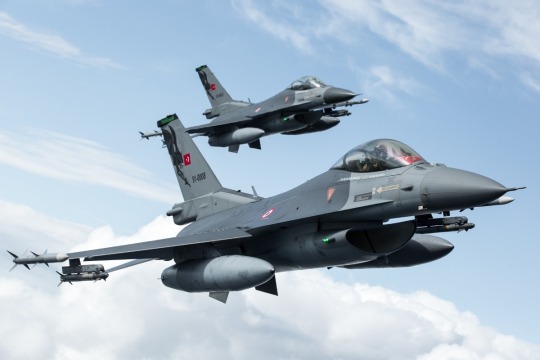
Biden tells Erdogan to "solve the Sweden issue" to be able to buy the F-16
Fernando Valduga By Fernando Valduga 05/30/23 - 08:26 in Military
U.S. President Joe Biden told his Turkish counterpart on a call on Monday that the latter would have to abandon his objection to Sweden's entry into NATO in order to buy F-16 fighters.
The exchange allegedly occurred when Biden called Erdogan to congratulate him on his victory in Turkey's presidential elections on Sunday.
Ankara sought new F-16s after the U.S. rejected its proposal to buy F-35 for the purchase of Russian S-400 missile systems.
“I congratulated Erdogan. He still wants to work on something in the F-16. I told him we wanted a deal with Sweden, so let's do it. And so we will get back in touch with each other," Biden told reporters before leaving the White House.
After Russia invaded Ukraine, Sweden and Finland applied to join NATO, abandoning long-standing military non-alignment policies. Accession proposals must be approved by all 31 NATO members. Turkey and Hungary have not yet approved Sweden's candidacy.
Turkey is against Sweden's accession to the alliance because it believes that the Nordic country is home to the Kurdistan Workers' Party (PKK), which used weapons against the Turkish state in 1984, an accusation that Sweden denies. The PKK is considered a terrorist group in Turkey, Sweden, the United States and Europe.
Sweden also criticized Turkey for human rights abuses and democratic standards, irritating politicians in Ankara.
Tags: Military AviationF-16 Fighting FalconNATO - North Atlantic Treaty OrganizationTAF - Turkish Air Force / Turkish Air Force
Fernando Valduga
Fernando Valduga
Aviation photographer and pilot since 1992, has participated in several events and air operations, such as Cruzex, AirVenture, Daytona Airshow and FIDAE. He has works published in specialized aviation magazines in Brazil and abroad. Uses Canon equipment during his photographic work around the world of aviation.
Related news
MILITARY
Germany can contribute Eurofighter jets to fighter coalition for Ukraine
30/05/2023 - 16:00
MILITARY
Norway say goodbye to its P-3 Orions after 54 years
30/05/2023 - 14:00
MILITARY
Egypt in advanced negotiations to buy 12 Chinese J-10 Vigorous Dragon fighters
30/05/2023 - 11:00
MILITARY
Uruguayan government confirms negotiation for purchase of BAE Hawk jets
05/30/23 - 09:00
MILITARY
Dassault CEO opposes Belgian participation in the SCAF fighter program
29/05/2023 - 16:00
MILITARY
U.S. Marine Corps receives its first Boeing 737 aircraft converted for military use
29/05/2023 - 13:00
homeMain PageEditorialsINFORMATIONeventsCooperateSpecialitiesadvertiseabout
Cavok Brazil - Digital Tchê Web Creation
Commercial
Executive
Helicopters
HISTORY
Military
Brazilian Air Force
Space
Specialities
Cavok Brazil - Digital Tchê Web Creation
2 notes
·
View notes
Text
Turkey said on Wednesday that it summoned the German ambassador to protest a police operation against Turkish journalists operating in Germany.
Some early media reports spoke of the journalists' "arrest," although a statement from police and prosecutors later on Wednesday suggested they were briefly detained during a search operation and then released, but at no point were formally under arrest.
Turkey's Foreign Ministry said in a statement that "the detention of Frankfurt bureau representatives of Sabah newspaper by the German police today without justification is an act of harrassment and intimidation against the Turkish media."
German officials did not name the individuals, saying only that they were men aged 46 and 51.
Turkish media — including the affected publication, the German-language arm of the pro-government Daily Sabah newspaper group — reported that it was two senior reporters at the publication, Ismail Erel, Sabah's most senior German journalist, and Cemil Albay, editor-in-chief of Sabah Europe.
The ages and names appear to match.
The arrests follow soon after Turkey's presidential election first round on Sunday and in the run-up to the runoff vote in which incumbent President Recep Tayyip Erdogan appears to be the favorite, based on first round results. The foreign ministry in Ankara also said the timing of the incident so soon after the vote raised the question of whether it was a "deliberate act."
What did German officials say of the raid?
The public prosecutor's office in Darmstadt and south Hesse's police issued a joint statement on Wednesday saying that two private apartments had been searched as part of a preliminary investigation.
The information that police made public also seemed to corroborate media reports that Sabah's publishing of information about a supposed supporter of Erdogan opponent Fethullah Gulen living in Germany was the cause of the police interest, possibly violating German privacy laws.
"In the context of a preliminary investigation by the Darmstadt prosecutor's office on suspicion of the spreading of personal data in a way that could endanger the individual, police forces searched the private residences of two journalists, aged 46 and 51, on Wednesday morning in Mörfelden-Walldorf," the statement said.
"During the operation investigators seized electronic data storage devices among other potential pieces of evidence. At the conclusion of the criminal police activities the two men were released again."
Police and prosecutors said that to protect the ongoing investigations they were not able to provide any further details at that point.
The European Center for Press and Media Freedom, a nonprofit based in Leipzig, shared an early English-language Turkish report on the issue on Wednesday and said that it "condemns the detention and will monitor the case."
"Press freedom must be upheld, we demand justice and transparancy," it said.
Reporting on alleged Gulen supporter the underlying reason?
The limited information from police appeared to corroborate media reports suggesting police interest was the result of the newspaper's recent coverage about a man residing in Germany who is alleged to have ties to Fethullah Gulen. The front page of Sabah Avrupa (Sabah Europe) recently carried an image of the man's private family residence in Germany. German laws on privacy protection in the media are comparatively strict.
Turkey often complains about people it deems terrorists or otherwise criminal, often either allies of Gulen or Kurdish activists, being able to live in Europe or North America. The country's recent obstruction of Finland's now-completed and Sweden's ongoing bids to join NATO were justified on this basis.
Germany is home to Turkey's largest diaspora community. The roughly 1.5 million still-eligible postal voters in Germany were an important component in Erdogan's first round success, with a far higher proportion supporting the incumbent from Germany than the roughly 49% of votes Erdogan claimed overall.
2 notes
·
View notes
Text
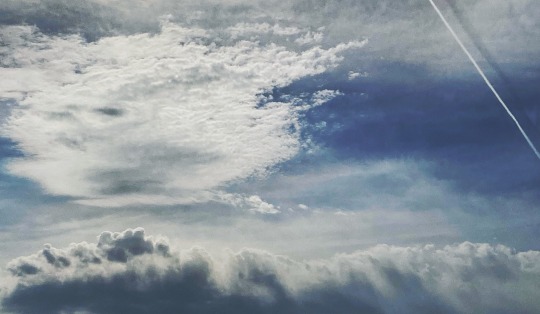
Monday, 15 May 2023
Well Done:
Today I finally grasped the reasons behind my depressive mood: the overall dissatisfaction with my life and the idea that there isn’t much that can actually fix it. Learned helplessness took a stage of my mind. This is quite basic, however excruciating it might feel.
I listened to a helpful podcast about career switch. Making one step at a time.
To better:
There is still lack of focus in my evening. I meant to do an ACA homework, but got distracted by mom, by Instagram etc. Set a plan ahead and adjust to energy level.
At the work my head was distraught, and I fully engaged into the process. I tracked time and oh my there weren’t much of a break besides lunch. I’m fully aware that this kind of deep diving into the work is a first step of burnout, and I shall hold myself from overstraining.
Delights:
The latest episode of “Succession” was a pure pleasure. I’m happy to know that politics is an explosive topic not only in my area.
Eating a salad all by myself.
Podcast about vitamins.
The second tour for Turkish presidential elections. What a pleasure to see autocracy being threatened by opposition! Let me see more of it and closer to home!
#mental health#self healing#healing journal#adult children of alcoholics#therapy journal#therapy#healing#val’s photo#aca#spring photography#blue sky#succession#career change#depression recovery#depression help#burnout#workaholics
4 notes
·
View notes
Text
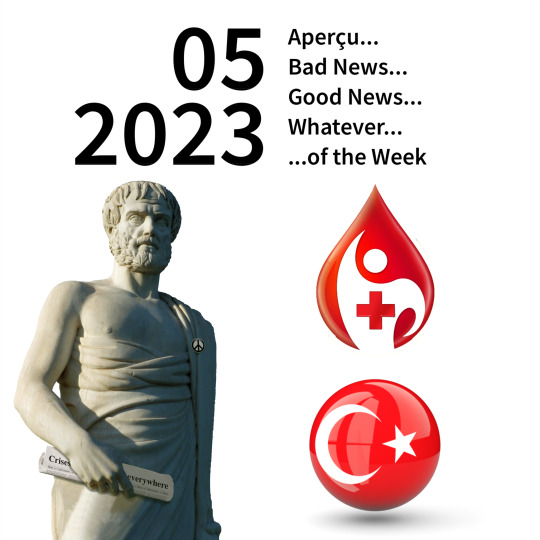
2023 / 05
Aperçu of the Week:
"People owe progress to the discontented."
(Aldous Huxley, British writer and philosopher, i. e. Brave New World)
Bad News of the Week:
One in three people in Germany will need a blood donation in their lifetime, according to statistics from the German Blood Donor Service. This is only in rare cases (12%) due to blood loss in accidents or injuries, as seen on TV. Much more frequently, for example, cancer patients (19%), gastrointestinal patients (16%) or heart patients (16%) are dependent on it during operations or treatments. Even the most modern medicine cannot do without the red lifeblood. Since blood still cannot be produced artificially.
This is why the current development is so dramatic: presumably because of the Corona pandemic, many people stayed as far away from medical facilities as possible. Out of fear of becoming infected as well as out of good will not to be a burden on the already overloaded health care system. Blood donations have therefore fallen dramatically. Currently, only about half of the required blood is available. Regular willingness to donate is also important, because the blood components remain usable only up to the 42nd day after donation.
The situation is just as bleak for organ donations. According to the German Foundation for Organ Transplants (DSO), there are currently around 8,500 seriously ill people urgently waiting for a donor organ - of which there are too few. In 2022 alone, 407 kidney and 86 heart patients therefore died. Yet (to put it sarcastically) no one who dies as a healthy person, for example in an accident, still needs their organs. Others do. Leaving religious convictions aside, the reason for the lack of willingness to donate organs is a frighteningly stupid one: the lack of documentation.
According to the German Federal Center for Health Education (BZgA), 82% of the population is basically willing to donate an organ. But only 44% have documented this - the easiest way is an organ donor card, about which relatives are informed. And this even includes the refusals. The way out could be simple: the so-called "contradiction solution". In this way, everyone would be an organ donor in principle, unless he or she expressly objects. But neither the health minister of the last government - Jens Spahn of the conservative CDU - nor the current one - Karl Lauterbach of the social democratic SPD - could get their way politically. In addition, a national register would have to be set up first. This would take years just for data protection reasons. So for the foreseeable future, only one thing remains: the rare commodity of solidarity. Sadly, this is obviously not enough right now. It costs lives. In Germany alone, every single day.
Good News of the Week:
Like Xi Jinping or Vladimir Putin, Turkish President Recep Tayyip Erdogan has tinkered "his" state to maintain his personal power. The principle is called the "presidential system," which tends to weaken parliament and strengthen the position of the president. Many can't even remember a time before Erdogan; the leader of the AKP (Adalet ve Kalkınma Partisi) party has now been in power for twenty years. Elections are due again on May 14 of this year, and of course the autocrat is seeking re-election.
But headwinds are forming: six Turkish opposition parties forged an alliance this week to prevent just that. The alliance wants to transform the presidential system back into a parliamentary system, strengthen the rule of law and freedom of the press, and bring the president's power back to a democratic level. For example, the president should no longer be able to rule by decree, and his term of office should be limited to seven years.
The initiative comes at just the right time. Many opposition figures have been muzzled by Erdogan's power apparatus in recent years. Most recently, Istanbul Mayor Ekrem İmamoğlu, who was considered a promising candidate. He was sentenced to two years in prison and banned from politics for allegedly insulting the election commission. Perhaps for this reason, the newly formed alliance has not yet named a top candidate.
That alone will not end in one fell swoop the massive economic, administrative, monetary, and judicial crisis that Turkey has now endured for years. But the mere prospect that there might be an alternative with a realistic chance of success to the increasingly inevitable permanent president is welcome. Especially for the fragile democracy on the Bosporus. After all, democracy is the essential basis for Turkey's perspective in the EU. And the nation will not be able to achieve lasting peace, prosperity and security any other way.
Personal happy moment of the week:
Last week I got a new colleague. I was allowed to choose him myself. The good impression his application made was confirmed in an online meeting. We agreed before we had even met in person. Because that didn't happen until his first day at work. Which started chaotically right away, because we had just learned that the office would be moving in the next few days. So the actual work is left undone and we have to deal with sorting out documents, clarifying furniture, planning workstations, packing office supplies, etc. And the new colleague proves to be helpful, hands-on, uncomplicated and resilient. It's nice when the second impression even surpasses the first.
I couldn't care less...
...how the U.S. is now dealing with the alleged Chinese spy balloon in their airspace. Shoot it down? Let it fly on? Protest diplomatically? Surprise: China is spying on the West. Ugh. It would be easy if China actually needed balloons for that. That would be like hoping to prevent Russian disinformation campaigns by restricting the supply of newsprint. Both take place primarily on the Internet. Which is as open as a barn door. When the Corona pandemic caused x million employees worldwide to move to the home office, not even a quarter of companies took security measures to protect all their private data connections. Any questions?
As I write this...
...I am disappointed in Brazil's President Lula da Silva. He wanted to do many things differently and better than his unspeakable predecessor Jair Bolsonaro. In environmental protection, for example. But even he did not prevent what had been looming for a few weeks and actually happened yesterday: the so-called "controlled sinking" of an ailing aircraft carrier full of pollutants. Robin Wood speaks of a "30,000-ton toxic package." Just like that. Because it's cheap. The "São Paulo" now lies at a depth of 5,000 meters in international waters. And I wonder if this is not only shockingly ignorant of the marine ecosystem, but not actually illegal. If not, it must become so as soon as possible, before this example is copied.
Post Scriptum
In the British cabinet of Rishi Sunak, as before, there is no responsibility for climate protection. Instead, there are separate ministers for Scotland, Wales and Northern Ireland, as well as cabinet members with no area of responsibility and three for the military complex. There is also - whatever that means - a "Chancellor of the Duchy of Lancaster" and a "Lord Keeper of [the] Privy Seal" with cabinet rank. Is it just me who feels that the United Kingdom is clinging more to the long-gone past than actively tackling the challenges of the future?
#thoughts#aperçu#good news#bad news#news of the week#happy moments#politics#aldous huxley#germany#blood#organ#donations#medicine#erdogan#turkey#democracy#opposition#work colleagues#united states#China#spying#lula da silva#brazil#robin wood#rishi sunak#climate protection#united kingdown#toxic#reform#public health
5 notes
·
View notes
Text
1 note
·
View note
Photo
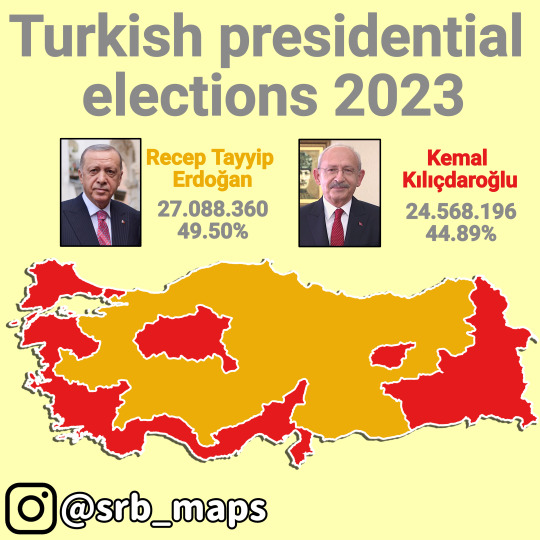
Turkish presidential elections 2023 🇹🇷
by srb_maps
76 notes
·
View notes
Text
Turkish Coups And The Army’s Decreasing Influence Under Erdogan Leadership
Türkiye has witnessed several military coups since its establishment as a republic in 1923, but under Recep Tayyip Erdogan, Turkish democracy has consolidated and the army’s influence on politics and social life significantly diminished.
— TRT World
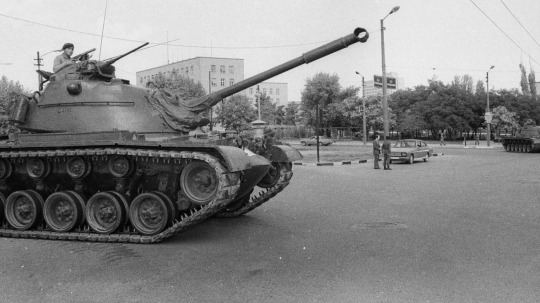
Turkish tanks march during the 1980 military coup.
Since 1960, Türkiye’s democratic governance has been interrupted several times by military interventions, severely damaging the country’s progressive political agenda.
All military interventions happened when a conservative government was in power – in 1960, 1971, 1980, 1997 and 2007.
The last of these military assaults on an elected government occurred on July 15, 2016, when rogue elements in the Turkish army – members of the FETO terrorist organisation – launched a coup attempt against the democratically elected government of Türkiye.
Besides stifling democracy by banning political parties, the military interventions also led to the execution of political leaders like Adnan Menderes, the then-prime minister of the Democrat Party (DP) government between 1950 and 1960.
But this trend of military interference has effectively ended under the leadership of President Recep Tayyip Erdogan, who heads the AK Party.
The Erdogan leadership, backed by a large section of Turkish society, was instrumental in not only defeating the 2016 coup attempt but also successfully challenging the 2007 memorandum, which attempted to prevent Erdogan from becoming the country’s president.
Over the past two decades, the empowerment of civilian leadership under the AK Party has seen Recep Tayyip Erdogan claim back-to-back election victories since 2002.
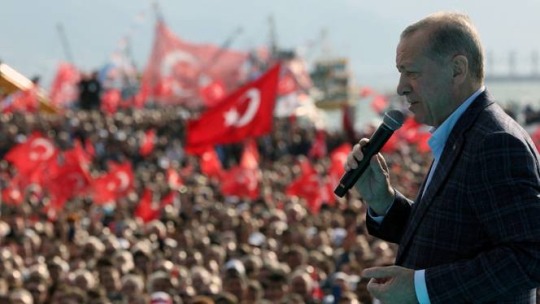
Turkish President Tayyip Erdogan addresses his supporters during a rally ahead of the May 14 presidential and parliamentary elections, in Izmir, Türkiye, April 29, 2023.
Here is a brief history of Turkish military coups and how the AK Party challenged the military’s interference in civilian politics:
1960 Coup
In 1950, Ankara moved to a multi-party system with the end of the one-party rule of the Republican People’s Party (CHP), founded by Mustafa Kemal Ataturk, the founding father of Türkiye.
In the next three elections in 1950, 1954 and 1957, the DP achieved back-to-back victories, riding on the popularity of Menderes.
However, the DP’s dominance in the hustings annoyed the CHP and the military, both of which advocated a harsh interpretation of French secularism (laicism) that demanded a clear separation of state and religious affairs.
A section of army officers, who claimed to be inspired by Ataturk’s principles, decided to oust the Menderes government on May 27, 1960. This despite the fact that Ataturk, a former Ottoman general and military leader of the Turkish Independence War (1919-1922), had advised the military leadership not to interfere in civilian politics.
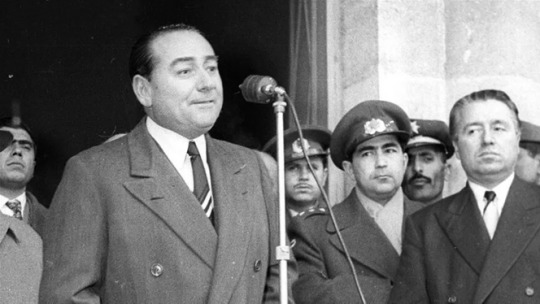
The 1960 military coup targeted the Adnan Menderes government, which won back-to-back election victories between 1950 and 1957.
Remarkably, the 1960 coup was done bypassing the military’s chain of command, and top generals became part of it only in the later stages of the military intervention.
While its first leading figure was Cemal Madanoglu, a left-leaning general, it was backed mainly by young officers.
Some analysts believe that a section of the coup plotters might have had a pro-US tilt, as the Menderes government was known to have sought political rapprochement with the Soviet Union prior to the plot.
The coup brought a new constitution as well as a crucial legal framework, the Internal Service Law, which regulated the workings of the Turkish Armed Forces and legitimised the military’s interference in civilian politics.
Article 35 of this law tasked the army with the specific duty of “protecting and watching over the Turkish homeland and Republic of Türkiye designated by its constitution”. This article was in force until 2013, ensuring a legal ground for successive military interventions.
1971 Memorandum
Like the 1960 coup, the 1971 military memorandum was launched against a conservative government under the Justice Party (AP) leader Suleyman Demirel, who claimed to follow Menderes’s political objectives. Demirel led his party to victory in both the 1965 and 1969 elections.
While Demirel claimed to be the new embodiment of the DP legacy, the traditional wing of his party criticised his pacifist stance against the military’s continuing clout on Turkish politics. The dissenting wing demanded revocation of all political bans on the former Democrat Party members, but Demirel argued that such a move might anger the army.
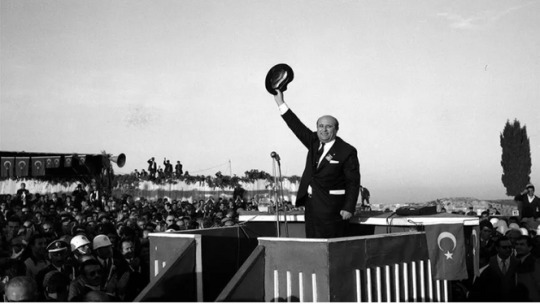
Türkiye's Justice Party leader Suleyman Demirel salutes people during a rally.
As a result, the traditionalist wing – which included several leading AP deputies – left the party in late 1970, weakening Demirel’s hold in power.
In the meantime, violent clashes broke out between leftists and right-wing political groups. The ideological differences spilled over to the military, where factions with left and right-wing affiliations were formed, defending opposing political views.
In 1971, tensions between the military factions escalated as a left-leaning faction led by Madanoglu, the leading officer of the 1960 coup, planned to oust the Demirel government through a coup on March 9.
In response, a right-leaning military wing backed by much of the chain of command prevented the coup attempt and then gave a military memorandum to the Demirel government, urging him to leave power to pave the way for a new government backed by the army.
The memorandum included a stern warning to the democratically-elected government. “If this matter cannot be realised quickly, the Turkish Armed Forces is determined to take over the administration directly by fulfilling its duty to protect and watch over the Republic of Türkiye, which is given to it by the laws,” it said.
When the Demirel government resigned, the military saw it as a sign of compliance with their demands. It didn’t push further, like dissolving parliament or banning parties.
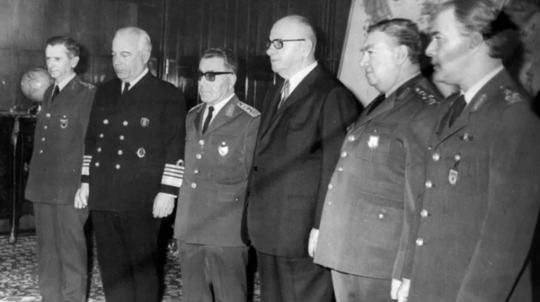
The picture shows the leading generals of the 1971 Memorandum with Nihat Erim, the prime minister of the technocrat government (third from the right), approved by the army.
The new government that assumed power under Nihat Erim, a former CHP deputy, launched a largescale purge in the military to kick out personnel with political affiliations. It also backed the execution of some leading communist leaders like Deniz Gezmis.
Demirel’s compliance with the 1971 military intervention and his support to the Erim government diminished his political standing; he didn’t win a majority in parliament after his ouster but led several coalition governments as the PM.
Bulent Ecevit, a leading CHP politician who opposed the 1971 memorandum, became the prime minister in 1973 as his party got the most votes in the national elections the same year.
1980 Coup
As coalition governments became the order of the day during the 1970s, the military saw these developments as a failure of the Turkish political class.
The military intervened once again in September 1980 and with full force.
In 1977, then PM Demirel also launched a military purge based on inside information that leading generals might launch a coup to topple him.
Kenan Evren, a top general, took over as the commander of Turkish Land Forces, a position traditionally seen as the stepping stone to becoming the chief of general staff in the future.
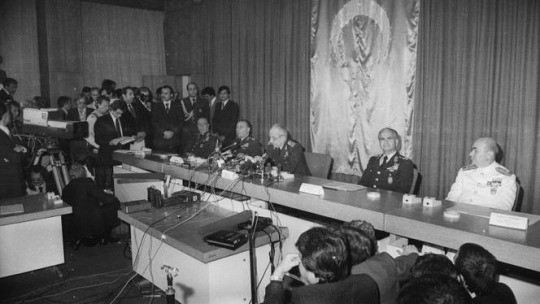
Kenan Evren, the top general of the Turkish army, makes an announcement during the 1980 coup, which banned political parties and leaders of the 1970s.
Paradoxically, Evren ousted the Demirel government in 1980, banning him and other political leaders along with their parties. Unlike previous interventions, Evren’s military rule continued for over three years.
The 1983 elections saw Turgut Ozal, a former member of the Milli Gorus movement – which had long opposed the military’s clout over politics – become the next prime minister as his Anavatan Party (ANAP) gained a majority in parliament. Ironically, just two days before the polls, Evren had made a veiled criticism of Ozal.
Postmodern Coup of 1997
Like the 1970s, the 1990s, too, witnessed the emergence of coalition governments, with Ozal’s party losing the parliamentary majority.
On the other hand, Necmettin Erbakan’s Refah Party (RP), the political wing of the Milli Gorus, gained strength across the Turkish electorate as opposed to centre-left and centre-right parties. After the 1995 poll, Erbakan formed a coalition government in 1996.
Like the previous Menderes and Demirel governments, the strictly secularist military did not like the Erbakan government, which was ousted in army-led political manoeuvring, starting with the February 28 military memorandum in 1997. The military intervention is called a postmodern coup due to its behind-the-scenes orchestration.
During the process, Erbakan and Erdogan, the latter, who was the RP mayor of Istanbul at the time, were banned from politics as the RP was closed down by the Constitutional Court.
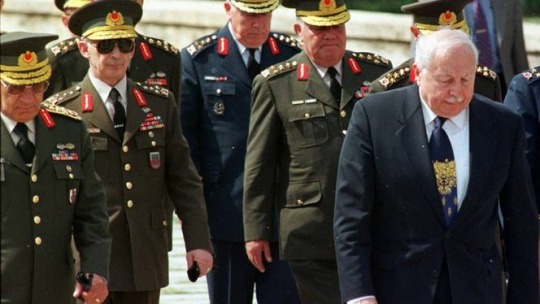
Turkish Prime Minister and Refah Party leader Necmettin Erbakan walks with top Turkish generals during an event prior to the military's February 28 postmodern coup.
Once again, much like previous coups, the February 28 intervention made Turkish politics more fractured, leading to a multi-party coalition as well as a large economic crisis, which would essentially bring Erdogan’s AK Party to power single-handedly in 2002.
AK Party Weakens Military Interference
The AK Party, which is rooted in the RP but formed as a centre-right party in 2001, claimed Türkiye’s large conservative electorate by winning a landslide election victory in 2002. The AK party under Recep Tayyip Erdogan launched large-scale political reforms to further democratise the Turkish state and its institutions.
But in 2007, when the country’s presidential election was scheduled in parliament, a political crisis emerged as the military issued an e-memorandum against the Erdogan government, voicing veiled opposition against the AK Party’s candidate, Abdullah Gul, whose wife wears a headscarf.
The e-memorandum came in response to a debate raised by some politicians and commentators, who defended a strict interpretation of French laicism, claiming that electing a president with a hijabi wife would undermine the secularist foundations of the Turkish state.
Unlike previous interventions, the Erdogan government did not cave into the military pressure and called a critical referendum in October to change the constitution to enact the rule of electing presidents by a popular vote.
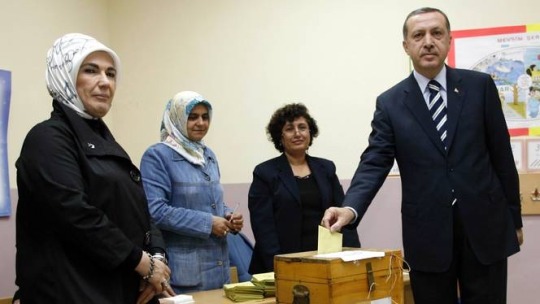
Then-Turkish Prime Minister Recep Tayyip Erdogan, accompanied by his wife Emine Erdogan, left, casts his vote for the referendum at a polling station in Istanbul, Oct. 21, 2007.
The AK Party won a significant victory in the October referendum as 69 percent voted ‘yes’, favouring electing presidents by popular vote.
Many argue that this was a breaking point in weeding out the military’s influence in Turkish politics, as the AK Party also won a big majority in the July elections prior to the referendum. After this turning point, the military continued to lose ground against the civilian leadership.
In 2013, the AK Party government also revoked Article 35 of the army’s Internal Service Law, which gave the military a legal ground to intervene in civilian politics. The following year, Erdogan was elected the country’s president for the first time by a popular vote.
But again, on July 15, 2016, a failed coup attempt was launched by rogue elements in the Turkish army. These members of the FETO terrorist organisation, who aimed to infiltrate state institutions, made a desperate attempt to launch a failed bloody coup against the democratically elected government.
Erdogan and his democratic allies won once again against the coup plotters. In 2017, Erdogan called another referendum to change the country’s parliamentary system to a presidential model, aiming to establish a firm political structure against any other military intervention.
The measure was approved, and Türkiye turned into a presidential system.
0 notes
Photo

Amna Nawaz serves as co-anchor of PBS NewsHour.
Prior to joining PBS NewsHour in April 2018, Nawaz was an anchor and correspondent at ABC News, anchoring breaking news coverage and leading the network’s livestream coverage of the 2016 presidential election. Before that, she served as foreign correspondent and Islamabad Bureau Chief at NBC News. She is also the founder and former managing editor of NBC’s Asian America platform, built in 2014, to elevate stories from America’s fastest-growing and most diverse population.
At the NewsHour, Nawaz has reported from the White House, across the country, and around the world on a range of topics including politics, immigration, foreign affairs, education, gun violence, criminal justice reform, the climate, culture, and sports.
She also serves as an NBC News and MSNBC contributor.
Throughout her career, she has covered major events such as the January 6th attacks on the U.S. Capitol; the mass shooting at Robb Elementary School in Uvalde, Texas; the elections and inaugurations of President Joe Biden, President Donald J. Trump, and President Barack Obama; Hurricane Katrina; the 2010 Haiti earthquake; the U.S. war in Afghanistan; and the September 11th attacks.
Nawaz has interviewed multiple heads of state and international leaders including Afghan President Ashraf Ghani, Turkish President Recep Tayyip Erdogan, and former Israeli Prime Minister Naftali Bennett. She has interviewed numerous lawmakers and administration officials, including Secretary of State Antony Blinken, DHS Secretary Alejandro Mayorkas, and Commerce Secretary Gina Raimondo. Nawaz has also interviewed newsmakers across industries, including acclaimed director Ava Duvernay, actor Riz Ahmed, WNBA star Sue Bird, and country singer Reba McEntire.
Nawaz was part of NewsHour’s team honored with a Peabody Award in 2023 for its coverage of the gun violence epidemic in America, including her on-the-ground coverage of the shooting at Robb Elementary School in Uvalde, Texas. She was also part of the team honored with a Peabody Award in 2022 for Newshour’s coverage of the attack on the U.S. Capitol on January 6, 2021.
Nawaz previously won a Peabody for her documentary work on 2019’s “The Plastic Problem,” examining global plastic pollution and efforts to address it. Her other documentaries include “Raising the Future,” a 2021 documentary on America’s childcare crisis; and 2022’s “Life After Lockup,” which followed the lives of four formerly-incarcerated people to track the challenges of re-entry after prison.
In 2020, Nawaz hosted a criminal justice podcast, “Broken Justice,” which was named a finalist for the Silver Gavel Awards, honoring work that fosters the American public’s understanding of law and the legal system. She also hosted 2021’s “The Longest Year,” a pandemic-focused podcast series on the many ways Covid-19 changed Americans’ lives.
Nawaz has hosted three seasons of the primetime PBS series, “Beyond the Canvas,” featuring profiles and interviews of some of the world’s leading artists, musicians, and creators.
In 2019, Nawaz became the first Asian American and the first Muslim American to moderate a presidential debate.
While at ABC News, Nawaz hosted the documentary, “Roberts County: A Year in the Most Pro-Trump Town,” following four families’ lives over President Trump’s first year in office. She also hosted the podcast series, “Uncomfortable” for ABC News Radio, featuring in-depth, one-on-one conversations with thought leaders on the issues dividing America.
While at NBC News, she was the first foreign journalist to gain access to North Waziristan – then the global hub of Al Qaida and the Taliban - while pregnant with her first daughter.
Nawaz was a Fall 2021 Fellow at Georgetown University’s Institute of Politics and Public Service. She is a member of the Council on Foreign Relations, the Asian American Journalists Association, the South Asian Journalists Association, and the Inter-American Dialogue.
In 2023, Nawaz was named an A100 honoree by Gold House. She was the recipient of the Asian Pacific American Institute for Congressional Studies’ Vision Award and the Media Award from the Muslim Affairs Public Council’s Media Award in 2022. She has also been honored with the American Muslim Institution’s Excellence in Media Award in 2018 and an Emmy award as part the 2009 NBC News Special “Inside the Obama White House.”
She is the first-generation American daughter of Pakistani parents, born and raised in Virginia. Nawaz earned a bachelor’s degree from the University of Pennsylvania, where she captained the varsity field hockey team and studied abroad at the University of Zimbabwe. She later earned her master’s degree from the London School of Economics.
She lives with her husband, Paul, and their two daughters in the Washington, D.C. area.
Join Amna Nawaz and more at #UJCSummit23 on Dec. 1st in NYC. Visit ujcsummit.lnk.to/ujc23 to register.
0 notes
Text
The government of President Recep Tayyip Erdogan has waived nearly 30 billion lira, equal to 1.61 billion US dollars, in debts, fines and fees under a new law passed on Thursday.
“With the amendment made in … the law, the difference due to inflation accounting in student loan repayments has disappeared. Now only the loan amount used will be repaid,” Mehmet Kasapoglu, Minister for Youth and Sport, said.
The government has written off student loans’ interest rates and late fees worth 27 billion Turkish lira or 1.45 billion US dollars, all pandemic fines issued during the COVID-19 pandemic [2.7 billion Turkish lira or 145 million US dollars] and other debts to the state including utility bills under 2,000 lira (107 US dollars).
Student loans have been a major problem for years as the country’s economic crisis deepens.
More than 5.5 million citizens were not able to repay their student loans used to complete their university education. Now they will only pay off the exact loan without any interest rates.
Also, if debtors repay their debts by June 2023, their names will be removed from the financial black list of people who did not repay their credit card debts or used dud cheques.
Medical intern students who work at hospitals in their senior years will also receive a minimum wage and be exempted from tax.
The law comes in times of economic hardship and ahead of critical parliamentary and presidential elections in which President Erdogan faces the greatest challenge to his 20 years long rule. While the exact date of the election is yet not known, it is expected to take place by the end of June 2023.
Skyrocketing inflation and the lira’s decline in value have made most people poorer and left many unable to pay their debts.
According to official figures, Turkey’s annual inflation rate in October was 85.5 per cent and the lira lost more than 40 per cent of its value only in 2022.
17 notes
·
View notes
Text

Home Military
Turkey evaluates Eurofighters if F-16 fighter agreement fails
Fernando Valduga By Fernando Valduga 06/20/2022 - 11:00 AM in Military
The Turkish government may be interested in buying Eurofighter Typhoon fighter planes if the order to buy the F-16 from the United States does not progress.
The Commander of the Turkish Air Force, General Hasan Kucukakyuz, visited the United Kingdom last month, the main producer of the Eurofighter consortium, and met with the Commander of the Royal Air Force, Marshal Sir Mike Wingston.
Kucukakyuz also inspected the UK Rapid Reaction Alert that flies with Typhoon aircraft.
"The Eurofighter Typhoon can be a palliative option until we have the fifth-generation aircraft and the locally produced TF-X in our hands, of course, if we can't get the F-16s," said a Turkish government source. "The Typhoons are very good, of excellent quality."
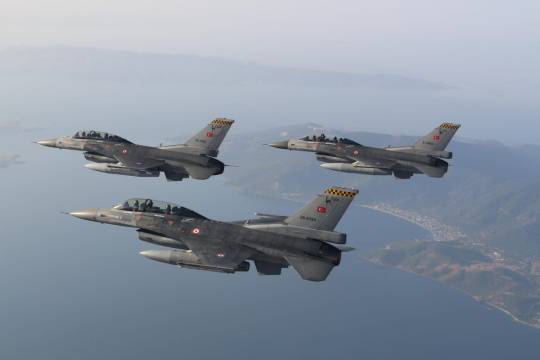
Turkey wants 40 more F-16 fighters.
In September, Turkey sent a letter requesting 40 F-16 fighter jets and 80 modernization kits to the U.S. government after being expelled from the F-35 program more than two years ago due to the purchase of the Russian S-400 missile defense system.
Turkish authorities say the U.S. government encouraged them to make the request after contacting a Turkish diplomat in Washington to pass on the information.
"They even knew how many jets we need and said 'why don't you place an order and see what happens?'" said a senior Turkish official.

Turkey also wants to upgrade 80 of its F-16 fighters.
Ankara took a long time to present the necessary documentation, but the people in Washington who closely monitor the issue said that U.S. President Joe Biden would support the request, so it is very likely that the agreement will be approved in the U.S. Congress, despite his generally unsympathetic stance in Turkey.
People familiar with the subject said that the F-16 request may go through Congress after the Turkish presidential elections of June 2023, since the Biden administration would not like to seem to be doing favors to the government of Turkish President Recep Tayyip Erdogan.
However, Turkey's recent threats of a military operation against Kurdish groups in northern Syria, as well as Erdogan's veto of Sweden and Finland's accession to NATO may complicate the whole process and Turkey may not receive the F-16s for a long time.
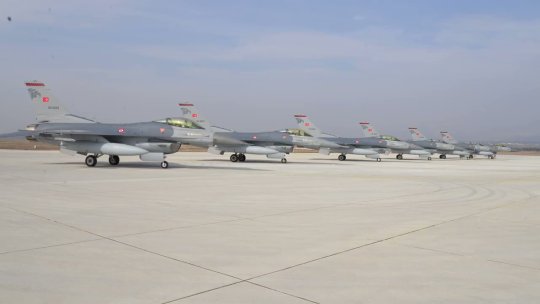
"The United Kingdom has been trying to sell the Typhoon aircraft to Turkey for a long time," said Ozgur Eksi, editor-in-chief of the defense site TurDef.com. “Italy, as part of the consortium, also tried its best a decade ago, but failed to convince the Turks of the time that they were focused on obtaining American hardware.”
'Protested history'
An opinion article that appeared on the Daily Sabah, aligned with the Turkish government over the weekend, said that Eurofighter, which is produced by a consortium from the United Kingdom, Germany, Spain and Italy, “has a proven track record and is the backbone of allied defense in Europe.”
The article stated that the approval of the F-16 is a draw and Eurofighter is the best option for the Turkish military from now on.
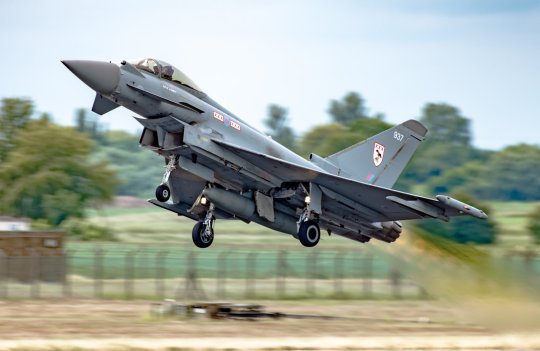
Turkish officers visited the QRA operation with RAF Typhoons.
"Since its inaugural flight in 1994, the Typhoon has been modernized and updated to be the most advanced fighter on the market," the article said. “Its structure is designed to reduce the radar cross-section and the updates are improving the aircraft's stealth capabilities. The fusion of sensors, high situational awareness, state-of-the-art avionics and electronics, super-cruise capability and sovereignty over mission data would provide the Turkish Air Force with a competitive advantage."
Asked about a possible agreement to sell Eurofighter Typhoon warplanes to Turkey, a spokesman for the UK Ministry of Defense said: "Turkey is a NATO ally and an important friend to the United Kingdom. The United Kingdom regularly talks to Turkey about capacity cooperation, as well as we have similar conversations with other allies."
A possible agreement would need to obtain the approval of Germany, Spain and Italy as well. Turkish-German ties are often tense and Berlin has a traditionally cautious approach to Turkish arms orders, as it is still blocking exports of some important materials to the Turkish arms industry.
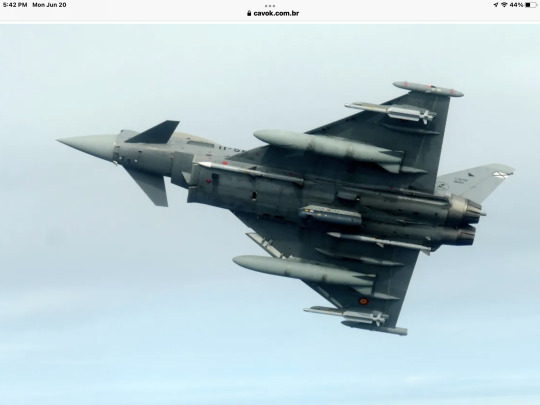
Last month, the United Kingdom completely suspended all restrictions on the export of defense products to Turkey that were brought after the 2019 Ankara offensive in northeastern Syria.
The source familiar with the Turkish government's thinking said that the Turkish military could easily adapt to Eurofighter platforms, but it would still require some manual labor. “It won't be very easy, but compared to a non-NATO system, it will be smooth.”
Eksi, the defense expert, says Turkey should get its hands on updated and modernized versions of Eurofighter, such as Tranche 3A or 4. “Otherwise, the Turkish military would need to do additional maintenance work on the bodies of the plane and also modernize their avionics,” he added.

The first Turkish TF-X is expected to fly in 2023.
Turkey and the United Kingdom maintain close defense relations through their partnership with NATO, and there is also industrial cooperation. British engine manufacturer Rolls-Royce and its local partner Kale must supply an engine for Ankara's first indigenous combat jet, the TF-X.
BAE Systems, based in the United Kingdom, is also collaborating closely with Turkish Aerospace Industries in the development of the jet, including its stealth technology.
Source: Middle East Eye
Tags: Military AviationEurofighter TyphoonF-16 Fighting FalconTAF - Turkish Air Force / Turkish Air Force
Fernando Valduga
Fernando Valduga
Aviation photographer and pilot since 1992, he has participated in several events and air operations, such as Cruzex, AirVenture, Dayton Airshow and FIDAE. He has works published in a specialized aviation magazine in Brazil and abroad. He uses Canon equipment during his photographic work in the world of aviation.
HOME Main Page Editorials Information Events Collaborate SPECIALS Advertise About
Cavok Brasil - Digital Tchê Web Creation
Commercial
Executive
Helicopters
History
Military
Brazilian Air Force
Space
SPECIALS
Cavok Brasil - Digital Tchê Web Creation
4 notes
·
View notes